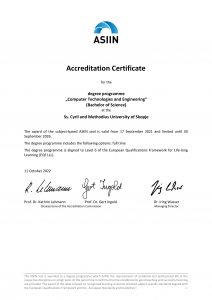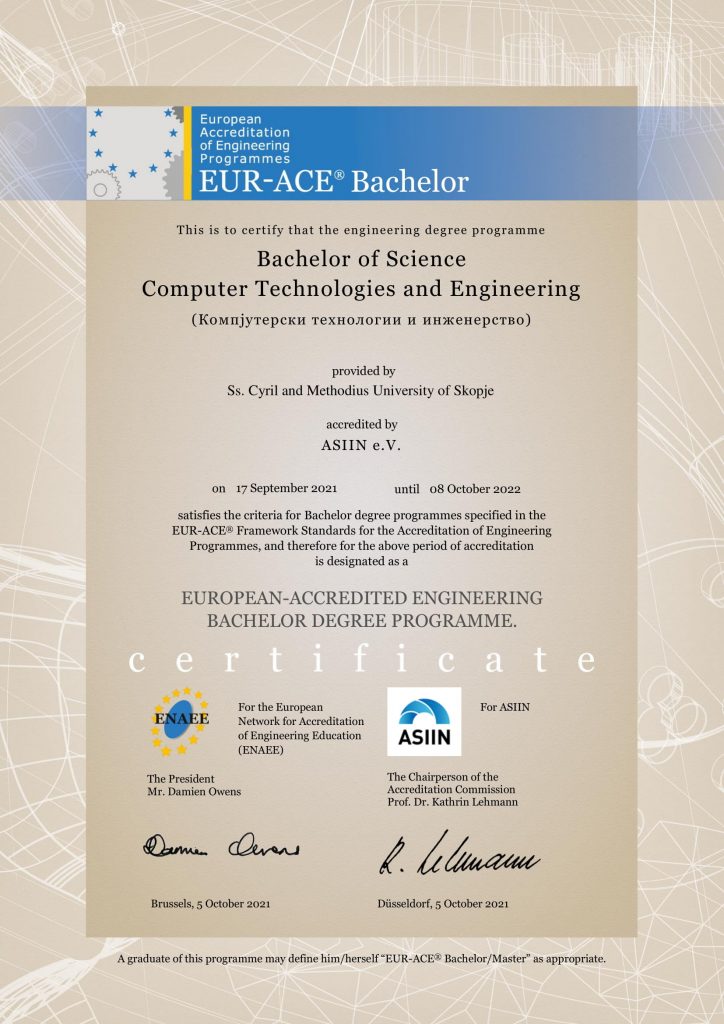ObjectivesLearning outcomesIIIIIIIVVVIVIIVIIIElective Courses
Study Programme
Computer Technologies and Engineering
Degree Programme
First cycle degree programme
Level of qualification
Bachelor of Science in Electrical Engineering and Information Technologies, in Computer Technologies and Engineering
Occupational Profiles of Graduates
This study program provides acquisition of broad computer engineering knowledge and flexible employment opportunities for the prospective students. Computer Engineering professionals are needed in a wide variety of industries that design computer systems based on new technologies in many areas of application. A graduated computer engineer from this profile, can continue his/her career in many industry areas, as well as the public sector, where the following is being designed, developed and implemented: computer communication systems and services; complex digital systems; modern information systems; Internet and network systems; analysis and development of intelligent networks. The acquired knowledge of students is an excellent basis for continuing studies in institutions and/or research centers all around the world.
The Programme Learning Outcomes
This study program enables students to gain extensive fundamental knowledge from all disciplines in computer technologies and engineering, as well as practical skills for analysis, design, implementation, administration and usage of complete hardware-software computer systems for various specific purposes. In particular, throughout their studies, the students can acquire the following competences and skills:
• Analysis, design and implementation of computer architectures and processors for general and special purpose;
• Analysis, design and implementation of algorithms and data structures;
• Design and implementation of databases and information systems;
• Knowledge, design, implementation and administration of wired and wireless computer networks;
• Administration and usage of operating systems, design and implementation of modules and drivers for computer systems, embedded and mobile devices;
• Knowledge and usage of distributed, high performance and cloud systems;
• Design and implementation of software server environments and applications (web and mobile);
• Design and implementation of systems on chip, embedded and Internet of Things systems;
• Knowledge and application of security and secure computer systems;
• Knowledge and application of data science, machine learning and artificial intelligence in intelligent systems.
International Accreditation
The first cycle study programs at FEEIT are accredited by the German Accreditation Agency for Study Programmes in Engineering, Informatics, Natural Sciences and Mathematics (ASIIN), which is a world leader in quality assurance in higher education. This accreditation confirms that the study programs satisfies the criteria for Bachelor degree programs specified in EUR-ACE Framework standards for the accreditation of engineering programs and the content studied are relevant to areas covered in study programs.


General Learning Outcomes
| Knowledge and understanding |
- Demonstrate knowledge and understanding in the scientific field of electrical engineering, based on education and training, including knowledge of theoretical, practical, conceptual, comparative, and critical perspectives in the scientific field according to the appropriate methodology.
|
| Application of knowledge and understanding |
- Demonstrate the ability to apply acquired knowledge and understanding in a professional manner.
- An ability to identify, analyze and solve complex engineering problems by selecting an appropriate method.
|
| Ability to assess |
- An ability to collect, analyze, evaluate and present information, ideas, and concepts based on relevant data.
- Making an appropriate assessment taking into account personal, social, scientific and ethical aspects.
|
| Communication skills |
- An ability to communicate effectively in both verbal and written forms with professional and non-professional audiences.
- An ability to work effectively as an individual or as a member of a team taking shared responsibility for collective results.
- Ability to participate independently, in a professional manner, in regards to scientific and interdisciplinary discussions.
|
| Learning skills |
- Commitment to the professional development and lifelong learning achieved through higher education, technical training, membership in professional societies, and other activities in order to update already acquired knowledge in the relevant field to achieve continuous professional growth.
- An ability to acquire and apply new knowledge as needed using appropriate learning strategies.
|
Specific Learning Outcomes
| Knowledge and understanding |
- Demonstrate knowledge and understanding in the scientific field of electrical engineering, based on education and training, including knowledge of theoretical, practical, conceptual, comparative, and critical perspectives in the scientific field according to the appropriate methodology.
- Demonstrate knowledge and understanding of research, development, engineering design in industrial processes and application of computer technology in the design and implementation of various types of computer systems for different purposes, including the areas: design and implementation of processors and general and special purpose processor architectures; design and implementation of general and special purpose computer systems; algorithms, structures and programming; performance analysis and evaluation, modeling, simulation and design of components of computer systems, computer networks and internet; use and administration of operating systems; design and implementation of modules and components of operating systems for different purposes; design and implementation of embedded systems for different purposes; design and implementation of various components of intelligent networks and so on.
- Understanding and knowledge of current issues related to scientific research and new sources of knowledge.
|
| Application of knowledge and understanding |
- An ability to identify, analyze and solve complex engineering problems.
- An ability to apply knowledge and understanding in a way that demonstrates professionalism to the relevant field or profession.
- An ability to identify, analyze and solve problems related to computer technologies and engineering.
|
| Ability to assess |
- An ability to collect, to analyze, evaluate and present information, ideas and concepts from relevant data.
- Making an appropriate assessment taking into account personal, social, scientific and ethical aspects.
- An ability to provide answers to both theoretical and practical issues, in order to give explanations and choose the appropriate solution.
- An ability to analyze, evaluate and present information, ideas and concepts from relevant data in the field of engineering computer technology, to recognize priorities and identify deviations from the usual paths, as well as to explain the reasons and to select and implement an appropriate solution.
|
| Communication skills |
- An ability to communicate effectively in both verbal and written forms with professional and non-professional audiences.
- An ability to work effectively as an individual or as a member of a team taking shared responsibility for collective results.
- An ability to participate independently and professionally in specific, scientific and interdisciplinary discussions.
|
| Learning skills |
- Commitment to professional development and lifelong learning through higher education, technical training, membership in professional societies, and other activities in order to update already acquired knowledge in the field and to achieve continuous professional growth.
- An ability to acquire and apply new knowledge as needed, using appropriate learning strategies.
- Demonstrate a high degree of independence initiative for learning and professional development.
- Understanding the need for learning and ability for continuous professional development, through the use of professional and scientific literature, professional training, continuing formal education, membership in professional organizations, etc.
- Awareness of new technologies and the ability to evaluate and use modern software development tools.
- An ability to use information technologies for distance and e-learning.
- Skills for cooperative, competitive and individual learning.
- Applying active teaching and learning techniques.
|
| During studying, the student may choose up to 4 courses from the faculty list of electives |
| During studying, the student may choose up to 4 courses from the faculty list of electives |
| During studying, the student may choose up to 4 courses from the faculty list of electives |
| During studying, the student may choose up to 4 courses from the faculty list of electives |
| During studying, the student may choose up to 4 courses from the faculty list of electives |
| During studying, the student may choose up to 4 courses from the faculty list of electives |





